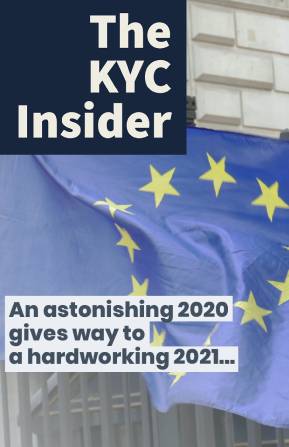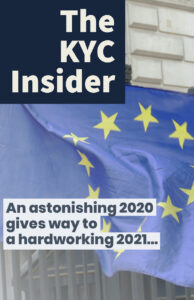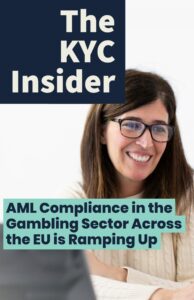An astonishing 2020 gives way to a hardworking 2021…
As we have closed the first month of 2021, we are now well into the first full year of our collective “new normal.” Hopefully soon, the days of lockdowns and restrictions will start to fade away, but for now, we ought to remain prepared and careful. As a society, however, we now have the knowledge that we can do much more remotely than thought possible just a year ago.
Our information technology infrastructure has withstood the immense bandwidth loads as people have adapted to virtual meetings and entertainment. For example, on April 4, 2020, the research firm Infinera states that 50,000 years’ worth of media was streamed on that day alone (Infinera). In addition, everyone’s financial, legal, and personal lives have each withstood this change, and we in the digital KYC industry, have held our own with a remarkable increase in the number of idents we have performed. The integrity of our industry via sound regulation and solid compliance, combined with a firmer understanding of the value digital KYC solutions, can play a vital role in this growth.
By value, we mean significant financial value. In Canada, for example, it is believed that USD $100 billion in value will be created by 2030 through the use of seamless remote identification means. With a population of under 40 million people, that is remarkable. As such, greater acceptance of remote KYC methods will continue as we have always predicted (Fintech zoom).
In Europe, the regulatory map has shifted. For example, in 2020, Portugal, Spain, France, Switzerland, Italy, and the Netherlands have – or began the process of – liberalizing their remote KYC regulations. We see similar trends in Middle Eastern countries, particularly this week’s announcement of Bahrain’s eKYC platform deployment – and beyond.
Remote KYC frameworks and standards are also being adjusted in a number of other industries. In Germany, the new interstate gambling treaty will come into effect on the first of July, and it will finally harmonize standards, licensing, and governance of the industry across the 16 federal states. This is a welcome development following many years of starts and stops. Additionally, youth protection / online safety, insurance, and other traditional industries where remote services have rapidly developed will also see changes this year. Where face-to-face contact was a foundation block toward the establishment of identity and trust, the digital KYC industry aims to provide the equivalent ability for businesses in the era of remote communication and social distancing.To always keep the level of trust, responsible regulators and service providers don’t rest on laurels of existing standards. Organizations such as the European Technical Standards Institute (ETSI) features the STF 588 working group which has worked through the pandemic to update identity proofing standards within trust services. The technical specifications are due this summer, and have the potential to affect identity proofing methods for AML use cases for example.
2021 is shaping up to be an interesting year for our eKYC industry and the world. Regardless of potential surprise in any way, we are heartened to know that we can handle what comes our way.
Brexit KYC Update.
One month into the UK being officially on its own, Europe and the UK are still feeling their way around in regard to new trade laws. KYC standards and practices remain a primary focus of AML laws within the UK and EU. Many loose ends in regard to laws were left to be smoothed out, but the good news is that the UK’s KYC standards were quite strong before Brexit. As such, we are seeing heavy responsibility continue to fall onto the legal and compliance departments of UK companies to maintain strong standards in their own country and to keep above the practices of any of the individual European member states.
While passporting laws no longer apply to the UK, these firms have the ability to meet their KYC obligations with companies like IDnow who operate in this realm throughout Europe, the UK, and globally. This is a remarkable, but doable, effort for well-run companies who emphasize security and compliance.
As the saying goes, “out of chaos comes opportunity,” and, sadly, fraudsters have added another complication to the UK’s momentous decision. Scammers have exploited COVID and Brexit worries on top of UK companies having to quickly and remotely forge new business relationships in Europe to maintain market access. Unfortunately, not all the people on the other side of the email or phone are real, as some have learned. To give some perspective, per research from Barclays, they saw a 20% rise in business scams in the last five months of 2020. In this same July to December period, impersonation fraud went up 79%. In the entire year, such impersonation tactics comprised 42% of all fraud attempts (Barclays News, BDaily News) As time moves forward, I am confident, we will see a normalization of activity and agreements to ensure practice.
The Netherlands’ DNB, Dutch Crytpo Exchanges, and Increasing Stress Over KYC Standards
In November 2020, De Nederlandsche Bank (DNB) imposed strict KYC rules on Dutch-based crypto exchanges, particularly in the area of withdrawals from exchanges. This set of rules goes further to control such functions than other European governments. This has caused users consternation and led to one exchange taking the DNB to court.
To ensure the safety and transparency of crypto assets, particularly when withdrawing funds, the central bank insists that Dutch users provide incredibly detailed information. Specifically, regulators seek salary / net worth, proof of residence, investment proceeds, nationality, and photographic proof of identity before any withdrawals are made. For most of 2020, exchanges sought clarification or amendment to this regulation, but little to nothing happened following publishing of the rules. Now they are in effect, companies have begun to make moves.
This January, Bitstamp decided to comply with the new rules. They informed their users that their accounts will be suspended if they do not comply with the rules by the end of the month. This news is in stark contrast to the actions of Bitonic who has filed suit against DNB to challenge these rules. This highlights the different strategies companies have taken toward these rules, and we will see soon how the market shakes out.
World Crypto News
Coin Telegraph
France Continues Regulatory Amendments in Remote Identity Proofing.
In 2020, the French Banking regulator (ACPR) introduced new measures to their AML laws that permit automated solutions for remote identity proofing in order to meet KYC obligations. The technical and security requirements have been given to the charge of the French Cyber Security Agency (ANSSI). ANSSI successfully published their first draft of technical requirements late last year. Herewith, they established a distinct set of criteria which identity solution providers must meet before any approval is granted. The first half of this year will give vendors the ability to submit their products for certification and approval.
Following its April 2019 announcement, The Central Bank of Bahrain (CBB) has finally deployed its eKYC platform for use by private financial institutions in the nation. The platform uses a national ID database and common API to be used inside institutional applications. Though government has had the ability to use this for some time, this program will permit this for private sector banks and relevant institutions. Government officials are touting speed, security, and privacy for users and institutions who use this platform, and the hopes for success in this realm are high.
Trade Arabia
A Pair of Research Papers Foresee Continued Breakneck Growth in eKYC Market.
Management / research consultancies Fatpos Global and Facts and Factors have undertaken the task of quantifying the growth of the eKYC industry, and the results are somewhat similar. Each effort has shown that industry-wide annual revenue of eKYC firms, break USD $1 billion by 2026 with an expectation to meet or exceed USD $1.5 billion by 2030. Each firm predicts industry growth to be in the range of 22% to 25% per year in this time frame.
KSU Sentintel Newspaper
Finance Yahoo
Get all information from our previous issues and Benefit from our deep knowledge and stay up-to-date on all regulatory changes within financial services, gaming and gambling, telecommunications and many more by subscribing to KYC Insider.







